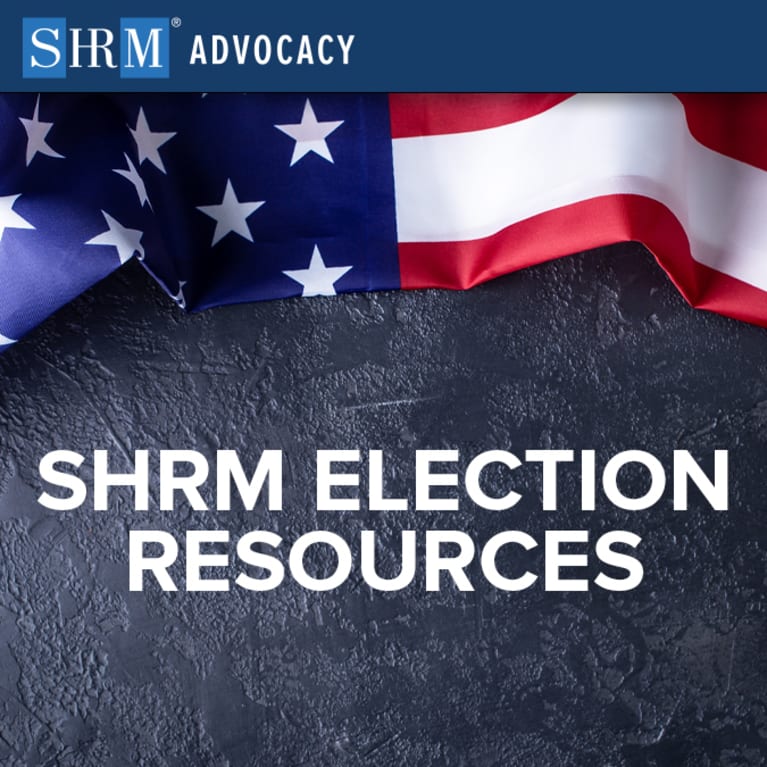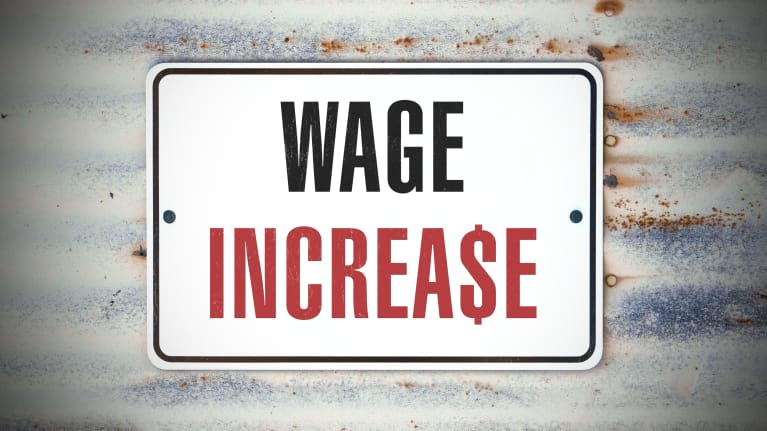Editor's Note: This article is part of a series that will review the similarities and differences between the two presidential candidates' positions on workplace issues. Check back each week for a new overview on such topics as labor relations, leave laws, health care, immigration, retirement assistance and more.
Whether or not to raise the federal minimum wage to $15 per hour is one of many employment issues at stake in the 2020 presidential election.
Democratic Party presidential nominee Joe Biden supports raising the federal minimum wage to $15 an hour by 2026. He also supports ending the tipped minimum wage and the subminimum wage for workers with disabilities. President Donald Trump has sometimes supported that stance, but Republicans generally have been opposed to an increase to $15 an hour.
In 2019, President Trump said he was open to a federal minimum wage of $15 per hour but then opposed House legislation that raised the rate. In July, he said he would make a major statement about the minimum wage, but the announcement never came.
The federal minimum wage has not been increased since 2009 and currently stands at $7.25 per hour. Twenty-nine states and numerous counties, cities and multistate employers have minimum wages higher than the federal minimum. And more states are joining the trend. Florida voters will consider a ballot measure this November that would raise the state's minimum wage to $15 by 2026.
Labor market economists disagree about what the consequences of a $15 minimum wage would be for U.S. workers and employers. Proponents of raising the wage argue that $15 an hour is closer to a living wage. They say that if the minimum wage had kept up with inflation, it would now be closer to $20 per hour.

Opponents to raising the federal minimum wage—especially a hike to $15—say that it would burden small-business owners with increased operating costs and have negative ramifications for the very workers it's supposed to help. Others say a nationwide minimum-wage rate is not realistic, given the wide cost-of-living disparities across the United States.
The Democratic-controlled House passed a bill in 2019 that would have raised the federal minimum wage to $15 by 2025. Senate Republicans decided not to take up the issue, and the White House said Trump would veto it. In analyzing the bill, the Congressional Budget Office (CBO) said about 27.3 million workers would likely see a boost in wages if the minimum wage was raised to $15, but the wage hike could cause an estimated 1.3 million workers to lose their jobs due to decreased business income.
"For most low-wage workers, earnings and family income would increase, which would lift some families out of poverty," according to the analysis. "But other low-wage workers would become jobless, and their family income would fall—in some cases below the poverty threshold."
The CBO also found that a $15 minimum wage would reduce business income and raise prices for consumers. Proposals to raise the federal minimum wage to $10 and $12 per hour by 2025 were also analyzed. Both options were found to boost wages but also increase joblessness, reduce business income and raise prices, although the effects would not be as drastic as those possibly resulting from a minimum-wage increase to $15 an hour.
Heidi Shierholz, director of policy at the Economic Policy Institute in Washington, D.C., and the chief economist at the Department of Labor during the Obama administration, stressed the positive outcomes of a wage increase to low-wage workers.
"CBO finds that the overwhelming share of low-wage workers would benefit from a $15 minimum wage and that as a group, low-wage workers would be unambiguously better off," she said. She also argued that the CBO's findings on job losses were overstated.
"Policymakers must be skeptical of their assessment of the employment impact," she said, "given that other careful reviews of the minimum-wage literature have shown that the average study finds small to no employment effects of minimum-wage increases" in states and localities that have boosted their rates.
On the other side of the debate, Alfredo Ortiz, president and CEO of the Job Creators Network, an Atlanta-based small-business coalition, said the report "confirms what we already know to be true—broadly raising the minimum wage to $15 an hour will reduce employment opportunities and is bad for business. The consequences will be especially brutal for small businesses, which already operate within razor-thin budget margins."
Douglas Holtz-Eakin, an economist, former director of the CBO and president of the American Action Forum, a Washington, D.C.-based policy and research group, said there was nothing surprising about the CBO analysis. "The basic mechanisms in play are by now well-understood," he said. "The rising minimum wage will increase pay for those minimum-wage workers who remain employed, as well as for those who would likely see a raise to keep the pay scales in the right order. These pay hikes will come at the expense of those workers who will not be employed, the profits of businesses and the higher prices that consumers must pay."
The majority of U.S. voters are in favor of raising the minimum wage, according to a 2019 survey conducted by Pew Research.
[For more on this year's election, see the SHRM Government Affairs Team's Election Resources.]
An organization run by AI is not a futuristic concept. Such technology is already a part of many workplaces and will continue to shape the labor market and HR. Here's how employers and employees can successfully manage generative AI and other AI-powered systems.




